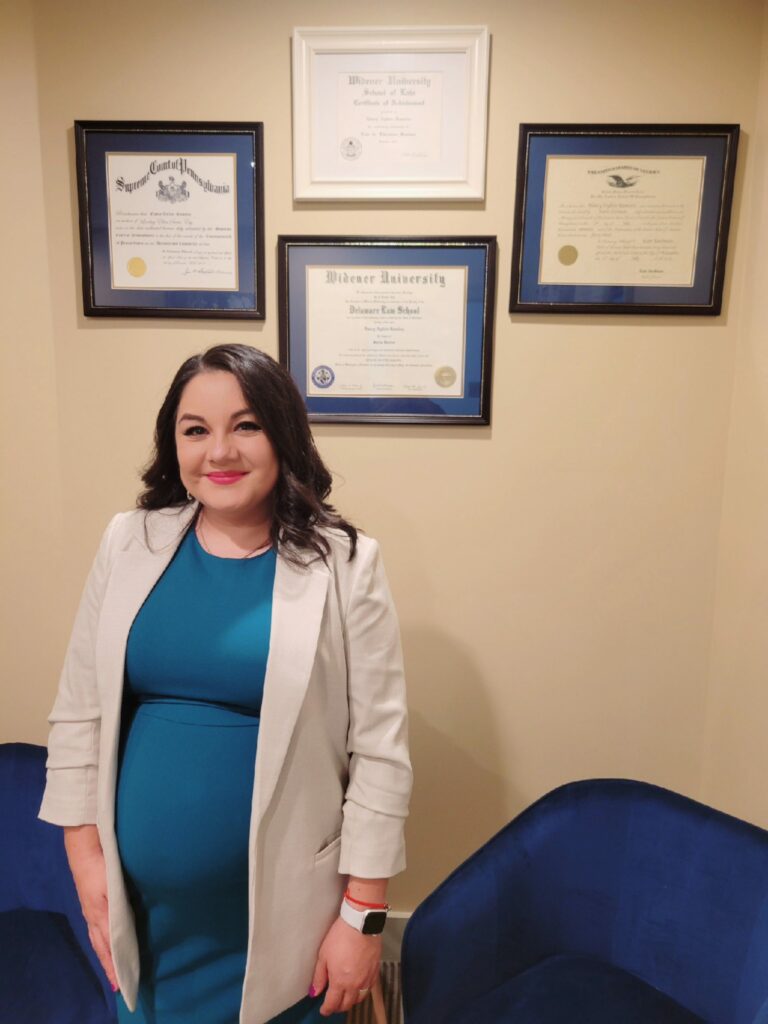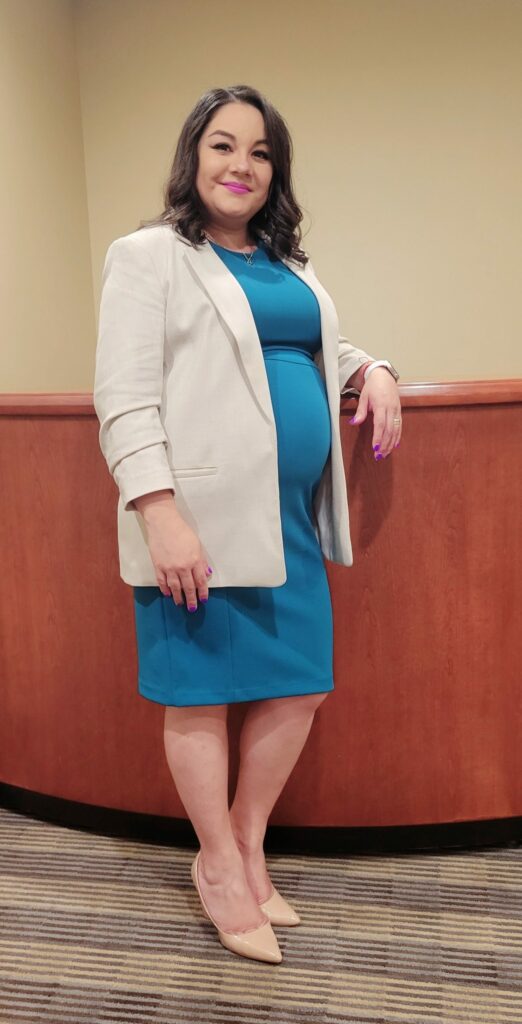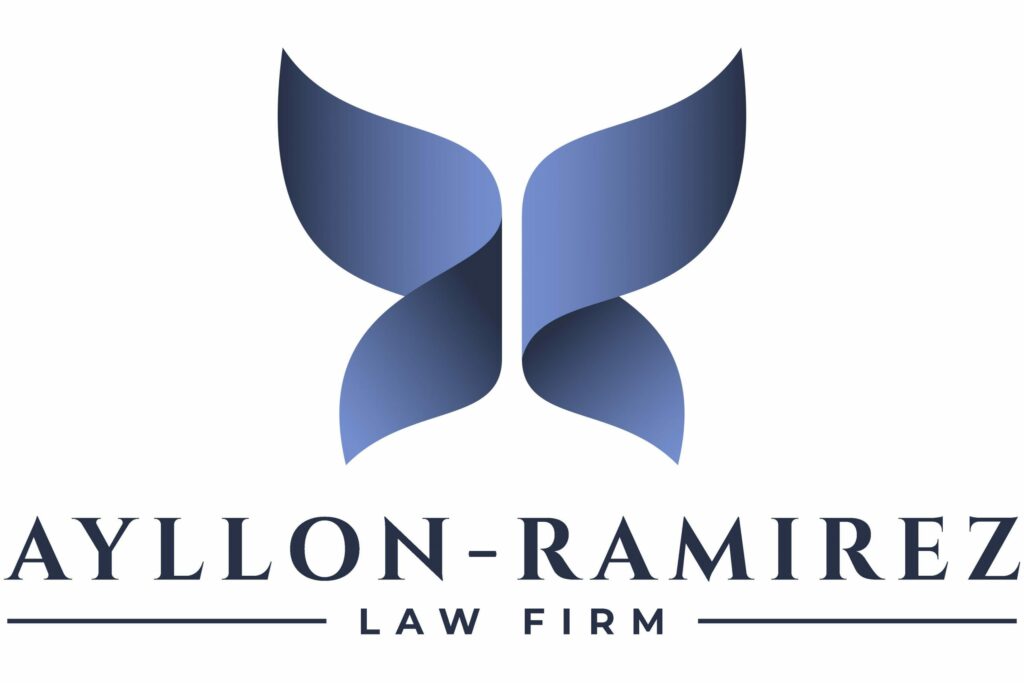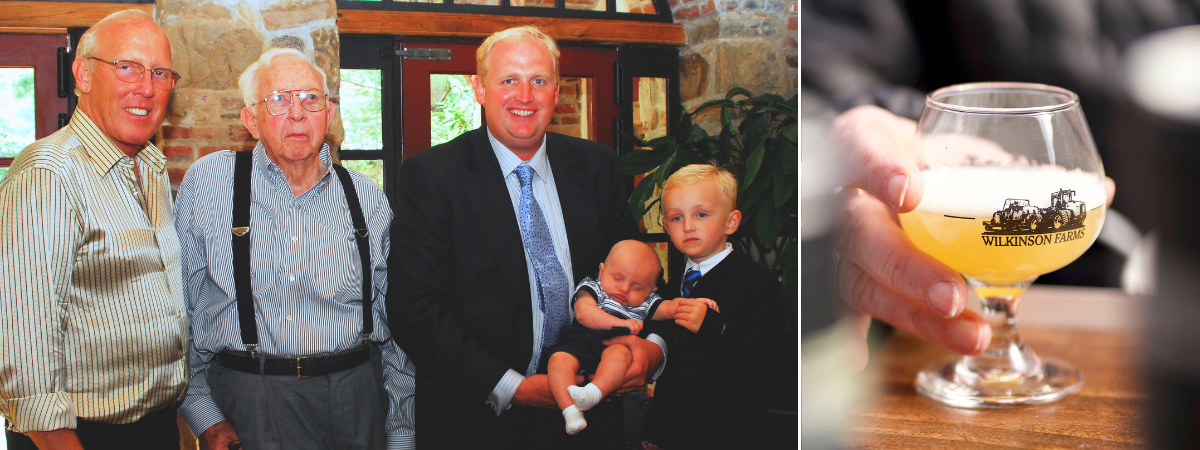Nancy Ayllon-Ramirez has been preparing her whole life for fulfilling the role she now has as a community leader with her own law practice, Ayllon-Ramirez Law Firm, in her hometown of Kennett Square.
But this accomplished young woman, one of AL DÍA magazine’s 40 under 40, experienced a moment of doubt last spring. “I was about to open my new business, my husband and I had just bought a puppy, and I found out I was pregnant with our first child,” she says, “and I wondered what I’d taken on.” She laughs at the suggestion that it’s like having triplets—with a difference. The moment passed, and she determined to forge ahead—knowing how many people need her help.
Nancy has lived in Kennett since she was six years old, when her family moved here from México. “In many ways, my family’s story is a typical immigrant story,” she says. Her father first travelled to the US to work in the mushroom industry when he was 18. He eventually got a green card, was able to bring his family here, and continued to work in the mushroom industry. Nancy started school at New Garden Elementary and graduated from Kennett High School in 2005. She was a speaker at graduation, where she was awarded the W. Earle Rupert Memorial Cup. But Nancy’s service to the Kennett community began long before she stood in her cap and gown receiving the school’s highest honor for scholarship, school spirit, and service.
While still in middle school, she volunteered as a translator for parent-teacher conferences and was involved at the very beginning of Kennett Middle School’s celebrated After-the-Bell program. She received awards from the American Legion and the Chester County Commissioners, and by the time she entered Bloomsburg University on a four-year Board of Governors scholarship, she was already a long-time community leader. Today, she’s a proud member of Longwood Rotary and also serves on the KAPA and Kennett Education Foundation boards. “I wish I had time to do more,” she says.
Everything Happens for a Reason
“I’ve come to believe that everything happens for a reason and eventually falls into place,” Nancy says. Although she wanted to go into nursing, when she didn’t get into Bloomsburg’s nursing program she majored in sociology and Spanish with minors in Latin American and ethnic studies. One of her life goals is to maintain her Spanish, and she smiles as she explains her Spanish major and a transformative semester studying in Veracruz, México. “Some people think I was cheating, since I grew up speaking Spanish,” she says. “But I never learned Spanish in school, and the colloquial Spanish I spoke is different from the language used in a professional setting.”
Today, Nancy speaks Spanish with her clients every day. She’s able to explain complex legal situations and also to clarify concepts so people understand their rights and responsibilities amid the tangle and confusion of US immigration law.
When she graduated from Bloomsburg in 2009, however, practicing law hadn’t even entered her mind. Like many young graduates, she didn’t know what she wanted to do. But she knew that she wanted to stay in school and that she enjoyed teaching. Over the years she’d been a tutor in dance, English, and statistics. “I always had an itch to be a teacher,” she says. She returned home and found a job as a housing case manager with the Maternal and Child Health Consortium, a program designed to help prevent homelessness whose funds were quickly depleted due to overwhelming need. “The experience led me to think about how I wanted to help people,” she says, “but I knew I had the capacity to help in bigger ways.”
State Senator Dominic Pileggi was looking for someone who was bilingual and involved in the community to explain constituent services in areas like education, transportation, and welfare. Nancy was able to continue helping people in this position, and she respects the former Senator for doing a lot to try to assist people. She also started to rethink her career. “He’s an attorney,” she says, “and I started thinking about the different career options a law degree offered.”
Nancy met with local attorney Lindsey Sweet—and the rest is history. “Lindsey is amazing,” Nancy says, “and we became great friends. She recruited me as her assistant, and I continued working as a legal assistant while attending law school at Widener University.”

From New Garden Elementary School to law school at Widener University, Nancy Ayllon-Ramirez has taken her education seriously and prepared herself to help her community.
Teaching Can Take Many Different Forms
Nancy loves coaching and guiding young people. “They give me so much fuerza,” she says, and it’s a role she takes very seriously. “A lot more people look up to me than I realize, and I never sugar-coat my story. Law school is one of the hardest things I’ve ever done,” she says. “I was full of self-doubt. I felt maybe it wasn’t my place to be there.” The lack of support for minorities made it even more challenging. But she persevered and graduated in 2016 and then passed the bar—eventually. “I took the exam three times before I passed,” she says. “I tell young people if they want to do this they should get support, including mental health resources if they need them.”
She gained experience as staff attorney for a Medical-Legal Partnership (MLP) at Puentes de Salud, a Philadelphia nonprofit similar to LCH. One of the founders of Puentes, as well as one of the nurses in the program, had worked in Kennett Square when Nancy and her family first came to this country—a fitting reminder of the difference that these organizations, and people, can make. While working with Friends of Farmworkers (now Justice at Work), Nancy focused on migrant workers’ rights and helping victims of local trafficking—a focus she continued while working with Karen Eichman at Eichman Law. “The immigration and family law services I offered, primarily to the Spanish-speaking community, complemented her employment-related services,” she says.
As a lawyer now able to educate her clients as well as the wider community about the incredibly complex and timely subject of immigration law, Nancy realized that she was also fulfilling her desire to be a teacher.
What’s in a Name?
Although she hadn’t envisaged that her dream would be realized quite so quickly, Nancy opened the doors to her own practice on June 1, 2021, and held a virtual grand opening on June 24th. Her husband, assistant, and intern, as well as her parents and siblings, were all there to celebrate in person—and she realized the full import of this moment.
“I never changed my name when I got married,” she says. The tradition is for a daughter to use her father’s first surname as her own first surname, and her mother’s first surname as her second surname. “Ayllon is unique and not a common name in México,” Nancy says, “but it has so much meaning here, in this area. It was very emotional to see my parents’ last names, Ayllon-Ramirez, on the door, and to reflect on all the sacrifices they made to give us so many opportunities.” Her parents held each end of the ribbon, which Nancy and her husband Erick cut together.
The vast majority of Nancy’s clients come to her for help with immigration issues, and she handles all sorts of cases in the vast and broad terrain of immigration law, from petitions to bring family members here to the US to green cards, residency applications, immigration defense, human trafficking, and asylum cases. Behind every one of these cases is a story of painful separation, loss, and often fear. It can be heartbreaking work, Nancy says, and it’s difficult not to take things to heart and cry with her clients. “It took me years to get here,” she says, “but I know that what they need from me is to be level-headed, honest, and clear.” The many success stories also help to remind her in the particularly difficult days why it’s so important that she’s here in her community, with the education and experience necessary to make a difference.
A recent human trafficking case is one example. A man came with his family from a South American country on a work visa from a Chester County company that promised to get him a green card after three years. “They took advantage of him,” Nancy says. “The working conditions were horrible, and year after year they refused to help him get his green card.” Nancy knew from her work with immigrants in Philadelphia about a rare type of visa to combat human trafficking called a “T Visa.” The application was successful, and now the man will get a green card. Nancy smiles as she describes the difference in their faces from the family’s first consultation with her to the day their case was approved. And she smiles even more broadly as she shares that their daughter, who had always aspired to be a nurse, now wants to be an attorney.

The hope for immigration law reform, Nancy Ayllon-Ramirez says, lies with future generations who will make their voices heard—including her daughter, who is due in November.
Education Is Key
Nancy sees education as a key part of her role—both with her clients and in the wider community. She enjoys explaining the immigration process and has done a series of Facebook videos on these topics and has also been featured on Telemundo and local news channels explaining recent updates and changes in immigration law.
“It’s ridiculous how broken the system is,” she says. “And that’s why it’s so complicated for my clients. There’s no one right way to enter this country, and even the existing processes are not guaranteed.” Even some who have been here for many years and are very successful can’t get a work permit, social security number, or driver’s license—they can’t come out of the shadows. The influx of Guatemalan refugees in our community are facing different barriers , Nancy says, which are exacerbated by the different dialects they speak.
“There’s so much misinformation and misunderstanding,” she says, “as stories get passed along, and people are often afraid to ask questions that they need the answers to in order to be successful with their case.” In addition, “The law changes every single day,” she says, which only adds to the challenge and confusion. “I always speak the truth to my clients, without making false promises, and they’re grateful that I take the time to explain why, for example, their case might not be able to go forward if they crossed the border more than once, undocumented, or have an encounter with law enforcement. Once I have all the facts in their immigration file and we have a clear picture of the background, we keep in contact—about anything new they hear or that I discover.” It’s a helpless feeling for people to be waiting, often for years on end, knowing that all they can do is wait. Once cases are filed with USCIS, a branch of the Department of Homeland Security, they’re out of the hands of lawyers, too, Nancy says.
Preparation and emergency planning are also essential, in case a family member is taken, or someone is picked up by Immigration and Customs Enforcement (ICE), for example. “All immigrants have rights, like every citizen, and as employees as well, which they need to know,” she says. “It’s very important for people to keep all of their documents in order and translated, if necessary—marriage and birth and death certificates, but also documents that prove how long they’ve been here.”

The butterfly on the Ayllon-Ramirez Law Firm logo signifies the migration and metamorphosis of the monarch and reflects the journeys and transformation of immigrants.
Immigrants often face incredibly difficult decisions. “I can explain: ‘This is what will happen if you stay, and this is what will happen if you go back. These are the options, and the decision is yours to make,’” Nancy says. The hope for reform in immigration law lies with her own and future generations of immigrants who will make their stories and voices heard in the courts and in positions of political influence. There’s no quick fix for a system that’s been broken for so long. “It will take years to fix it,” she says.
What can people in the community do to help? Donating time or money to the amazing nonprofits in our community that assist people in need is one thing, Nancy says. Organizations like KACS, Family Promise, and others are important partners in the work that she and many others do. But advocacy is also critical. “Educate yourself. Reach out to your Congresspeople and urge them to support the DREAM Act, for example, and legislation that offers relief for agricultural and essential workers.”
The butterfly on Ayllon-Ramirez Law Firm’s logo is a powerful symbol that expresses many aspects of the immigrant experience. “I wanted to signify immigration without being obvious,” Nancy says. Monarch butterflies migrate—many thousands of miles and across several borders—from México to Canada and back again every year. But the slow and amazing process of metamorphosis through which a caterpillar becomes a butterfly also reflects the slow and amazing transformation of immigration, as Nancy and so many others in our community work to help families and make a difference for people who bring so much value and beauty to our communities.
Ayllon-Ramirez Law Firm is located at 312 West State Street, Suite 214, in Kennett Square. The best way to contact Nancy is by phone (484-734-0606) or email (nancy@ayllonramirezlaw.com).




